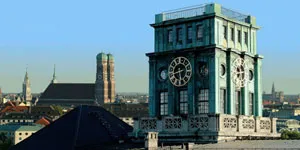
Munich University of Technology
"At home in Bavaria, successful in the world". That is the slogan which advertises Technische Universität München (TUM) in the world, linking provenance and posterity. The TUM-graduates are active throughout the globe and the TUM-researchers are at home on an international platform.
TUM was founded as a “polytechnic school” at the heart of Europe by King Ludwig II in 1868 and has still a technical profile including engineering, life and food sciences or informatics. Additionally, TUM focuses today on life sciences such as sport sciences, medicine, educational sciences or business administration (http://portal.mytum.de/fakultaeten/index_html). TUM has played an active role in transforming Bavaria from an agricultural state into a high-tech location. Rooted in this tradition, the university created a powerful international network. TUM is now an international university. It has approximately 20,000 students coming from all over the world. About 25% of the undergraduates are international students (www.tum.de).

TUM School of Management
One of TUM’s youngest faculties is the TUM School of Management (www.wi.tum.de), which was founded in 2002. It was ranked by Zentrum fuer Hochschulentwicklung (Center for Development of Institutions of Higher Education) as one of the top Business Administration universities in the country. This ranking increases our motivation to continue to sharpen our profile in the directions of technology and management. Our 25 departments in the fields of business administration, law, economics and life sciences offer an education consist of state of the art theoretical basics with a subsequent practical orientation to our students. One of the departments in the field of social sciences is the “Lehrstuhl für Psychologie”.

Lehrstuhl für Psychologie (Chair of Psychology)
Since 2006, Prof. Dr. Hugo M. Kehr is a Full Professor at Munich University of Technology and chair of psychology. He teaches leadership and motivation, human resource management, I/O psychology, general psychology, research methods in applied psychology, and self-management. His research interests focuses on motivational psychology including implicit and explicit motives and motive discrepancies. With his compensatory model of motivation and volition (Kehr, 2004) Hugo M. Kehr established the general framework for the research he and his team conduct. The framework is used to do research on flow experience, corporate visions, effective rewarding, open innovation, self-regulation and volitional depletion as well as leadership, both applied and basic research. Prof. Kehr’s team consists of postdoctoral researchers, PhD students, student assistants, and technical staff members. Please check our homepage for further information about the team and research projects: